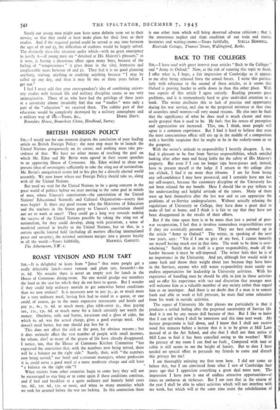BRITISH FOREIGN POLICY
Sta,—I would not for one moment dispute the conclusion of your leading article on British Foreign Policy: the next step must be to launch the United Nations prosperously on its career, and nothing must take pre- cedence of that. We have no other means of reaching the goal on which Mr. Eden and Mr Bevin were agreed in their recent speeches to an approving House of Commons. Mr. Eden wished to abate our present ideas of sovereignty sufficiently to take the sting out of nationalism. Mr. Bevin's unequivocal assent led to his plea for a directly elected world assembly. We now know where our Foreign Policy should take us, along with all the United Nations.
But need we wait for the United Nations to be a going concern in the great world of politics before we start moving to the same goal in minds of men, where Unesco's constitution—the constitution of the United Nations' Educational Scientific and Cultural Organisation—asserts that wars begin? Is there any good reason why the Ministries of Education and the teachers in the States party to Unesco's constitution should not set to work at once? They could go a long way towards making the success of the United Nations possible by taking the sting out of nationalism, for they could develop, along with patriotism, a sense of mankind centred in loyalty to the United Nations, but so that, in a certain specific limited field (including all matters affecting international peace and security), the national sentiment merges into a greater loyalty
to all the world.—Yours faithfully, MAXWELL GARNETT. The Athenaeum, S.W. 1.






























 Previous page
Previous page